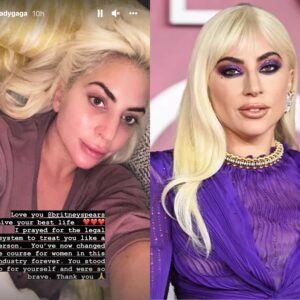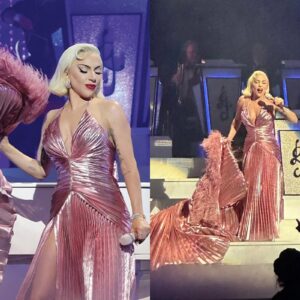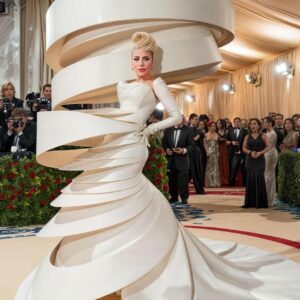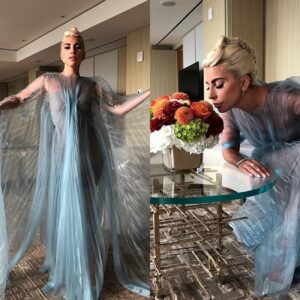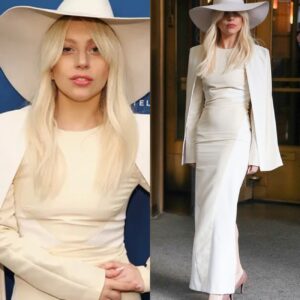Speaking on Oprah Winfrey and Prince Harry show The Me You Can’t See, the singer outlined further details of attack she first disclosed in 2014
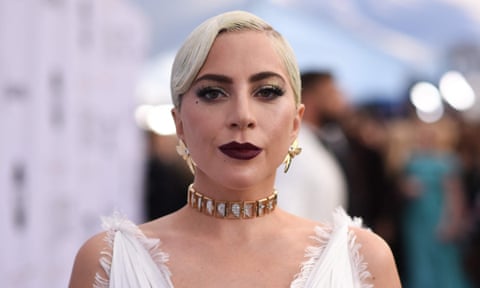
Lady Gaga has told new details about sexual assault she suffered when she was 19. Speaking on The Me You Can’t See, Oprah Winfrey and Prince Harry’s new Apple TV+ series about mental health, she said the rape – that she first disclosed in 2014 – was by a music producer and left her pregnant.
“I was 19 years old, and I was working in the business, and a producer said to me, ‘Take your clothes off,’” she said. “And I said no. And I left, and they told me they were going to burn all of my music. And they didn’t stop. They didn’t stop asking me, and I just froze and – I don’t even remember.” She said “the person who raped me dropped me off pregnant on a corner”.
She did not name the producer, and said: “I do not ever want to face that person again.”
Gaga first discussed the attack with radio DJ Howard Stern in 2014, saying: “I was a shell of my former self at one point.” In 2015, she said: “I didn’t tell anyone for I think seven years. I didn’t know how to accept it. I didn’t know how to not blame myself or think it was my fault. It changed who I was completely. It changed my body, it changed thoughts.”
She said the attacks left her with post-traumatic stress disorder. In 2016, she rebuked Piers Morgan for belittling her condition as “vainglorious nonsense” and questioning why she didn’t initially report the rape. That year she performed with survivors of sexual assault at the Oscars.
Speaking to Winfrey in 2020, she said: “I never dealt with it, and then all of a sudden I started to experience this incredible intense pain throughout my entire body that mimicked the illness I felt after I was raped.”
In The Me You Can’t See, she again describes her delayed traumatised response, saying she experienced a “total psychotic break”.
“First I felt full-on pain, then I felt numb, and then I was sick for weeks after. I realised that it was the same pain that I felt when the person who raped me dropped me off pregnant on a corner [by] my parent’s house, because I was vomiting and sick. Because I had been abused, and I was locked away in a studio for months.”
Around two years after surviving the abuse, she released her debut album The Fame in 2008 and became globally successful, with five US No 1 albums since. She also started an acting career, most notably with her Oscar-nominated lead role in 2018’s A Star Is Born.
She will next rejoin Tony Bennett for a duets album following their 2014 collection Cheek to Cheek, and star in Ridley Scott film House of Gucci alongside Adam Driver, Al Pacino and more.
I hope you appreciated this article. Before you move on, I wanted to ask if you would consider supporting the Guardian’s journalism as we enter one of the most consequential news cycles of our lifetimes in 2024.
With the potential of another Trump presidency looming, there are countless angles to cover around this year’s election – and we’ll be there to shed light on each new development, with explainers, key takeaways and analysis of what it means for America, democracy and the world.
From Elon Musk to the Murdochs, a small number of billionaire owners have a powerful hold on so much of the information that reaches the public about what’s happening in the world. The Guardian is different. We have no billionaire owner or shareholders to consider. Our journalism is produced to serve the public interest – not profit motives.
And we avoid the trap that befalls much US media: the tendency, born of a desire to please all sides, to engage in false equivalence in the name of neutrality. We always strive to be fair. But sometimes that means calling out the lies of powerful people and institutions – and making clear how misinformation and demagoguery can damage democracy.
From threats to election integrity, to the spiraling climate crisis, to complex foreign conflicts, our journalists contextualize, investigate and illuminate the critical stories of our time. As a global news organization with a robust US reporting staff, we’re able to provide a fresh, outsider perspective – one so often missing in the American media bubble.
Around the world, readers can access the Guardian’s paywall-free journalism because of our unique reader-supported model. That’s because of people like you. Our readers keep us independent, beholden to no outside influence and accessible to everyone – whether they can afford to pay for news, or not.
If you can, please consider supporting us just once from $1, or better yet, support us every month with a little more. Thank you.
News
Lady Gaga Says Britney Spears Has ‘Changed the Course for Women’ in the Music Industry ‘Forever’
“You stood up for yourself and were so brave,” Lady Gaga wrote to Britney Spears after the end of the “Lucky” singer’s 13-year conservatorship PHOTO: KARWAI TANG/WIREIMAGE;…
Lady Gaga set to return to Las Vegas this summer for eight shows on her Jazz & Piano residency at Park MGM
Lady Gaga is putting back on her Poker Face for another round in Las Vegas. The New York City native, 37, is reviving her Lady Gaga Jazz & Piano residency for eight shows…
Why Lady Gaga Skipped the 2024 Met Gala
It’s been five years since Lady Gaga walked the Met Gala carpet, and while Little Monsters were hoping that this would finally be the year of the pop superstar’s…
AFTER “SWEEPING” THE RED CARPET, LADY GAGA AGAIN DAZZLED WITH A “MOVING” DRESS
In recent days, not only music lovers but also the audience of the big screen can’t help but sob when looking at Lady Gaga. Appearing as a star…
Lady Gaga on Feud with Ex-Friend Perez Hilton: It’s All ‘Rooted in Madonna’
“He’s just mad that I don’t want to hang out anymore because I don’t want to be around fake people,” the “ARTPOP” singer said of dissolving her…
Lady Gaga is glamorous on the red carpet at the Grammy Awards
Singer Lady Gaga with high hair, light makeup, and seductive off-shoulder dress appeared on the red carpet at the Grammy Awards ceremony. Lady Gaga appeared on the…
End of content
No more pages to load
